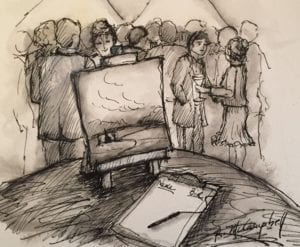Should Artists Donate to Charity Auctions?

Pen and ink illustration by Rachael McCampbell, 5 x 7″, ink on paper
Reprinted from the March issue of Nashville Arts Magazine
March 2017
by Rachael Mccampbell
How many charity events have you attended where a surgeon has donated a hip replacement or a lawyer has donated fifteen hours of their expertise? I’ve never seen that. Most of the time you see artwork donated by artists, who, for the most part, make much less money than those in other professions. So, my question is, why do charities keep asking the lowest-paid freelancers with no health care, retirement plan, or benefits to donate their time and talents, and why do artists keep saying yes?
I have spoken with many artists on this topic, and it’s complicated to say the least. Some want to donate because they love the cause. Others believe they will get public exposure. Some feel that even if their $2,000 painting sells for only $100, it’s $100 more for the charity. Some artists refuse to donate at all because auctions are often not promoted or marketed correctly and their art sells for below market value, which ultimately hurts them, their dealers, their collectors, and the art market in general.
Having attended many auctions, I’ve seen art shoved into a dark side room where the party goers don’t even know it’s there. Often guests are busy eating, drinking, and talking with their friends when suddenly an announcement is made: “There is 15 minutes left to bid on the art.” Event goers rush into the room where they have only minutes to look at badly lit art and make a decision to bid. The art sells for a song; the artist discovers they devalued the work; the charity gets a pittance, and it’s another case of wasted resources where no one wins. Here are some suggestions to create a happy compromise.
Artists:
- If you donate, choose wisely and give to only a few charities a year.
- Don’t give art you don’t like or can’t sell. Donate a good original piece or high-quality reproduction—no rejects.
- Set a reserve for your work in advance. If the auction doesn’t meet the minimum, you get your art back. This protects you, your dealers, and your collectors’ investment in your art.
- Weigh your options. Perhaps it’s better to sell your work at full price somewhere else and write the charity a check. Remember, “no” is a word too.
Charities:
- Offer a 50/50 split with artists. That way they make some money and you get what most art galleries make. That’s fair to everyone. It also encourages you to work harder and earn a higher dollar amount by better promotion of your event and auction.
- Give artists credit on the invitation and promotional materials. Provide a web presence that exhibits the art they are donating with a link to their website. It’s important that the public see the art multiple times before the night of the charity event. This gives them time to study the work, learn about the artist, and whet their appetite to purchase art at the auction.
• Consider asking collectors to donate art. They get a tax write-off while artists can write off only the materials they use to make the art.
• Hire an advisor to guide you in marketing, lighting, and displaying the art. A consultant can increase your total fundraising dollars.
Because more and more charities pop up each year with art auctions as a component of their fundraising plan, event goers have become inured and often don’t pay attention to the donations at all. Art critic and curator Mat Gleason advises artists to boycott charity art auctions altogether. “Donate cash to a good cause and . . . keep your art career safe from the bargain bin.”
To keep the value of an artist’s work up, consistency in sale prices is paramount. Auctions are unpredictable in that way. Artists, please don’t make an emotion-based decision to donate your art. You are not doing anyone any favors by giving your art away to an organization that doesn’t handle it with respect and lowers the value of your work. Weigh the facts, ask questions, write a contract, and make demands to protect you, your collectors, dealers, and even the charity itself by helping them to earn more money for their cause.
If you would like to see a copy of a contract for charity donations or get advice on how to better run your art auctions, please contact me. I can help. www.rachaelmccampbell.com
